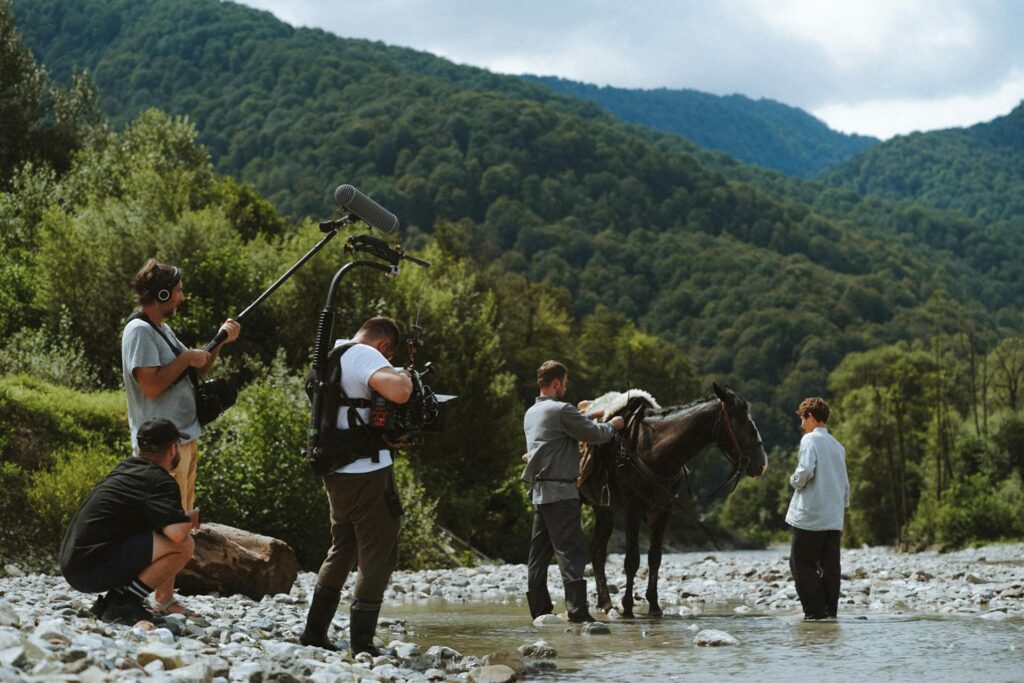
Managing Freelancers Without Stifling Creativity
Table of Contents

Managing freelancers effectively is truly an art, much like painting or playing music. It requires a delicate balance between giving clear guidance to align them with project goals and allowing enough freedom for their creativity to shine. At Luma Creative, we carefully select specialized freelancers tailored to each project, whether it is a commercial shoot, covering a corporate event, or a brand video piece, bringing in the right experts for the job. Imagine trying to conduct an orchestra without stifling the musicians’ individual flair. This guide helps producers with managing freelancers without micromanaging. Let’s explore strategies that promote collaboration, creativity, and mutual success.
Setting the Stage: Understanding Freelancers
Before diving into the nitty-gritty of management strategies, it’s important to step back and understand the unique dynamics of freelancers. Unlike in-house teams, freelancers operate with a level of independence that many treasure deeply. Recognizing this difference is the first step toward managing them efficiently.
Flexibility and Autonomy: Many freelancers choose this career path because they value freedom. They appreciate being able to set their own hours and work from places that inspire them. As a producer, establishing project criteria early on is key, but it’s equally important to leave room for their creativity to flourish.
Diverse Time Zones: Freelancers often come from all corners of the globe. Coordinating schedules to accommodate various time zones can be a challenge, but it’s essential to ensure everyone stays in sync.
Multiple Commitments: Freelancers might juggle several projects at once. This means they are masters at time management, but also that they need clear deadlines and expectations to keep everything balanced.
Understanding these factors will shape how you go about managing freelancers, helping cultivate an environment where they are motivated to deliver their best. Read more here about what motivation does to creativity.
Managing Freelancers Like a Pro

Communication can either make or break collaborative efforts, especially when managing freelancers. It’s not just about sending messages but also about listening and adapting. Here are some tips to master this art:
1. Clear Project Briefs
Starting each project with a clear and comprehensive brief is crucial. These should include the objectives, deadlines, deliverables, and any relevant project details. Think of it as a roadmap that enables freelancers to navigate the project landscape independently.
2. Open Communication Channels
Fostering open communication is key. While managing freelancers, make sure they feel comfortable reaching out with questions or updates at any time. This two-way street encourages dialogue and ensures everyone stays aligned.
3. Use Technology Wisely
Tools like Slack, Trello, or Asana can keep communication streamlined and focused. These platforms allow for updates without overwhelming meetings. Read more about how technology empowers collaboration.
4. Regular Check-Ins
Scheduling regular but concise check-ins can help focus on big-picture alignment rather than daily tasks. This builds trust and shows that you care about progress and challenges without micromanaging.
Setting SMART Goals
Have you ever set a goal only to realize later that it was too vague or unrealistic? That’s where “SMART” goals come in: Specific, Measurable, Achievable, Relevant, and Time-bound. Clearly defined goals can:
- Provide clarity and direction.
- Help measure progress and outcomes.
- Enhance motivation and focus.
Setting up these parameters will ensure that everyone knows what’s expected, thus minimizing misunderstandings and discrepancies.
Trust and Autonomy in Action
Trust is the backbone of any successful freelancer partnership. Without it, even the most skilled freelancers may find it hard to perform their best.
Building Trust
- Choose Wisely: When selecting freelancers, look for those who are not only skilled but also align with your project’s ethos.
- Empower Decisions: Allow freelancers to make decisions within set boundaries. This empowerment can lead to more innovative solutions.
- Acknowledge Efforts: Regularly acknowledge work well done. A simple “good job” can be incredibly motivating and foster a positive working environment.
Autonomy Fosters Creativity
When you give freelancers autonomy, you’re providing them the space to explore creative avenues. Encouraging them to bring new ideas to the table can enrich the project and pave the way for future collaborations.
Tools for the Trade: Project Management Software
Using project management tools can streamline processes and empower freelancers to manage their workloads efficiently. It’s like giving them the right instruments to play a symphony.
Recommended Tools:
- Monday.com: Ideal for organizing tasks and setting deadlines.
- Trello: Perfect for visual project tracking.
- Slack: Comprehensive for team collaboration and communication.
By selecting the right tool, producers can provide the structure needed to keep teams organized without constant oversight.
Managing Client Expectations
Clients often expect seamless service without realizing the complexities of managing freelancers behind the scenes. As a producer, you act as the bridge between client vision and freelance execution. Here is how to keep client expectations realistic and positive:
- Set clear boundaries early by explaining the workflow, revision rounds, and timelines upfront so clients understand the creative process.
- Communicate regularly with consistent updates on progress, milestones, and any potential risks before the client hears it elsewhere.
- Translate jargon by breaking down technical or creative language into client-friendly terms to avoid confusion and build trust.
- Manage revision expectations by clarifying how many revision rounds are included and what constitutes extra work to prevent scope creep.
- Be honest about challenges. If delays or issues arise, address them transparently and propose solutions rather than surprises.
Effective expectation management keeps clients confident, reduces friction, and sets the stage for a successful project.
Creating a Feedback Loop
Feedback is vital for growth and alignment. Here are strategies to ensure feedback remains constructive and beneficial:
- Be Specific: Provide clear examples when giving feedback.
- Balanced Approach: Combine constructive criticism with positive feedback to motivate.
- Encourage Two-Way Feedback: Allow freelancers to provide their input on processes and workflows.
Developing a feedback loop promotes continuous improvement and a deeper understanding between the team and freelancers.
Handling Last-Minute Changes
In production, last-minute changes happen often. Whether it is a client tweak or a creative pivot, how you manage these shifts can make or break your project timeline and budget. The key is to stay calm and strategic:
- Anticipate flexibility by building buffer time into your schedule and budget from the start to accommodate reasonable changes.
- Establish a clear process for submitting, reviewing, and approving changes. This should include who needs to sign off and how it impacts timelines and costs.
- Communicate quickly. Once a change request is received, inform all stakeholders immediately to reset expectations and adjust plans as needed.
- Track scope creep by keeping detailed records of all changes and their impacts on hours and budget to avoid surprises.
- Prioritize impactful changes. Not all last-minute requests carry equal weight, so assess and prioritize to maintain focus on what truly drives project goals.
Mastering last-minute change management helps you maintain control and keep your team and clients aligned even under pressure.
Recognition and Rewards
Recognition doesn’t always mean bonuses or gifts, although they’re certainly appreciated. Simple acknowledgments can be significantly motivating:
- Shout-Outs: Recognize excellence in meetings or team newsletters.
- End-of-Project Celebrations: Celebrate milestones or project completions together via virtual gatherings.
- Feature High Performers: For content creators, publish their work in visible spaces, giving them credit.
Recognition ensures freelancers feel valued, encouraging them to align closely with the project’s goals.
Lessons Learned: Post-Project Reviews
Closing a project is more than delivering the final files. It is a crucial opportunity to reflect, learn, and improve future workflows. Here is how to run effective post-project reviews:
- Gather all voices by including freelancers, clients when appropriate, and internal team members to get a full picture.
- Focus on what worked and what did not by celebrating successes and identifying bottlenecks, communication gaps, or scope issues.
- Document key takeaways by creating a brief report or checklist that captures lessons learned and recommendations for future projects.
- Implement action items using insights to update your SOPs, improve onboarding, or tweak communication protocols.
- Close the loop with your team by sharing learnings openly to promote a culture of continuous improvement and transparency.
Committing to post-project reviews turns every collaboration into a stepping stone toward smoother and more efficient productions.
Conclusion
The playbook serves as a guide for managing freelancers without needing to micromanage. This balance enhances creativity, leads to higher satisfaction, and ensures project goals are met efficiently. By applying strategies like clear communication, fostering autonomy, and utilizing the right tools, producers can transform freelancer relationships into successful partnerships.
As you navigate the freelance world, remember: respect and understanding are your most valuable tools. Create the space for creativity to flourish, and your projects will reflect the innovation and enthusiasm that only an inspired team can bring. Ready to embrace these strategies? Start implementing them today, and watch your projects soar!
Looking for the perfect freelance team tailored to your project’s unique needs? At Luma Creative, we connect you with skilled professionals who fit your vision and timeline.
Contact us today to build your custom creative crew and bring your next production to life with confidence!

William Cook
William founded Luma Creative to bring elevated, story-driven video production to corporate, tech, and nonprofit clients in San Francisco. With over a decade of directing experience across commercial, corporate, and other video projects, he leads with calm under pressure, sharp creative instincts, and a client-first mindset.

